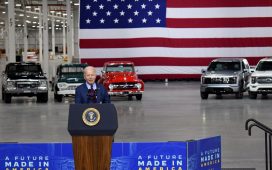
The Zero Emission Transportation Association (ZETA), a trade group whose members include the likes of Tesla, Waymo, Rivian, and Uber, is coming out in support of tax incentives for both the production and the sale of electric vehicles (EVs).
Domestic manufacturers of EVs and of their components, such as batteries, have received tax incentives which “have driven enormous job gains” in states like Ohio, Kentucky, Michigan, and Georgia, the group says.
“If the United States is going to continue to fight to bring those jobs here and actually compete to win against China, there needs to be a demand signal – like the New Clean Vehicle Tax Credit – aligned with that goal, otherwise we would be undercutting those investments and hurting American job growth,” ZETA executive director Albert Gore said in a statement.
The statement of support comes in response to reports that the incoming Trump administration plans to end the current $7,500 federal tax credit on the purchase or lease of an EV. Under Biden’s Inflation Reduction Act (IRA), an EV with key components, including batteries, made in the U.S. is eligible for the incentive upon purchase or lease of the vehicle.
According to some estimates, the share of EVs is expected to grow to 33% of the U.S. market in 2030. But repealing tax incentives on the production and sales of EVs is expected to reduce that share by at least 5%.
Despite the expected hit to EV sales, Trump’s plan to end the incentive has received the blessings of representatives from Tesla, the bestselling EV maker in the U.S. Tesla CEO Elon Musk was recently appointed by the incoming administration to lead a newly created “Department of Government Efficiency”.
While campaigning, Trump has promised to impose massive tariffs on imports, especially those from China. Earlier this year, the Biden administration already imposed 100% tariffs on Chinese-made electric vehicles.
China’s BYD, widely recognized as a global leader in the production of affordable EVs, recently backtracked from plans to reach the North American market.










